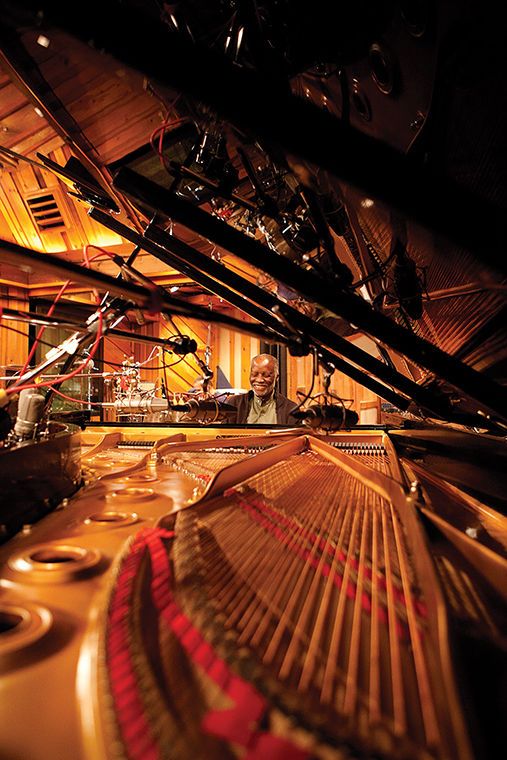Ahmad Jamal to light up Symphony Orchestra
Ahmad Jamal plays Chicago Symphony Orchestra on Oct. 10.
October 6, 2014
Ahmad Jamal, a jazz pianist who rose to fame in the 1950s, is playing Oct. 10 at the Chicago Symphony Orchestra, 220 S. Michigan Ave.
Jamal’s Chicago visit is one of a few U.S. performances he has put on this year, to be followed by his performance at the Strings of Autumn music festival in Prague on Oct. 19. Jamal has been playing for more than 60 years and has recorded 64 albums, including one of his best known works, At the Pershing: But Not For Me, which was recorded live in Chicago in 1958 at the Pershing Hotel. At 84, Jamal is still touring worldwide and playing the music that made him a renowned jazz musician.
Jamal came to prominence during the era of hard bop, an extension of bebop that originated and was made popular by saxophonist Charlie Parker. However, Jamal deviated from that sound and played in his own style that was compatible with what would become cool jazz, according to David Adler, an adjunct professor of jazz history at the Aaron Copland School of Music at Queens College in New York City.
“Jamal really spoke to that aesthetic of restraint and calm,” Adler said. “But also great depth. It was not light and frivolous—there was a lot of depth, even if it was restrained and a little more peaceful than the no-holds-barred of bebop of the previous era.”
Although Jamal is not credited with creating cool jazz, he has been a great influence on jazz musicians past and present, said Adler. In jazz trumpeter Miles Davis’ autobiography, Adler said there are passages from Davis himself describing the effect of Jamal’s music.
“[The passages] emphasize the economy of sound and understatement in Ahmad Jamal’s playing,” Adler said. “The use of space, meaning the notes you don’t play … creating breaths in the music, and also his arrangements, that kind of create these little worlds.”
Bill Kirchner, a long-time jazz critic, composer and author of “The Oxford Companion to Jazz,” said one of the greatest legacies Jamal had was his influence on Davis who later covered his material.
“His biggest influence, aside from piano players who got ideas from him rhythmically and harmonically, was on Miles Davis,” Kirchner said, “[Davis] got a lot of ideas about the use of space and also ideas about repertoire from Jamal, there were a number of tunes that Jamal recorded that Miles later recorded.”
Agreeing with Kirchner, Adler said Jamal’s influence had much to do with his playing style and the trio he arranged to play his music.
“His trio from the ‘50s, with the bassist Israel Crosby and drummer Vernel Fournier, is considered one of the great influential trios of the era,” Adler said. “It had a major impact on [people like] Miles Davis.”
Jamal’ s influence on Miles Davis would later influence other jazz musicians, making Jamal a somewhat hidden but crucial figure in jazz, Adler said.
“The impact Davis had affected everyone,” Adler said. “So [Jamal] had that kind of indirect influence on a whole wide swathe of players.”
Vincent Pelote, the interim director of the Institute of Jazz Studies at Rutgers University, said Jamal was highly influential to players like Davis because he was different from most piano players at that time, which in turn led to his music being enjoyed by a much wider audience.
“Jamal is much more musical, and it works for him,” Pelote said. “I think a lot of people got onto it because it had an appeal beyond just jazz because it was melodic, he was quoting other songs and Broadway shows, [and] other people got into it too who weren’t heavy into jazz.”
Even though Jamal is not a household name like many other jazz artists, his music is just as legendary as the likes of Thelonious Monk and Chick Corea in the jazz community because, according to Adler, there was no other pianist like Jamal.
“He’s really in a class by himself,” Adler said. “There is really no one who sounds like him. I think Ahmad Jamal is hard to categorize … a lot of people overlook pianists like Ahmad Jamal, but the contribution he made is still just huge.”
Kirchner also said Jamal’s influence was important to the progression of jazz, even if some of his albums were not as critically acclaimed as other albums.
“Jamal did what he did, he’s an important influential player,” Kirchner said. “You take the totality of what he did, you take the work that is genuinely great and influential and that may not be to some, and that’s the way it is with lots of great artists.”
Adler said Jamal’s legacy continues to grow as he keeps touring and performing his work.
“He’s 84, and he’s still going,” Adler said. “It’s an incredible accomplishment. He’s really at the top of his game still. He sounds great and is still going strong, so there’s high praise for somebody who can really hang on for so long and not change their art and not compromise, and he’s definitely done that.”
Jamal plays at 8 p.m. on Oct. 10.








